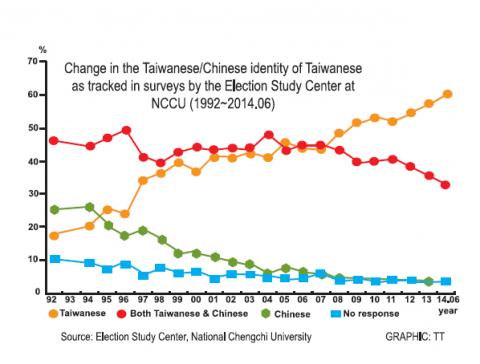A poll by National Chengchi University’s Election Study Center showed that a record-high 23.8 percent of respondents support Taiwanese independence, while a record-low 32.7 percent regard themselves as both Chinese and Taiwanese.
Meanwhile, 60.4 percent said they are Taiwanese, according to the poll, released on Wednesday.
The data were collected from three separate polls titled “Taiwan Independence versus Unification with the Mainland Trend Distribution in Taiwan,” “Taiwanese/Chinese Identification Trend Distribution in Taiwan” and “Preferences Trend Distribution in Taiwan.”

The data showed that the percentage of people who regard themselves as Taiwanese is the highest since June 1992, and those identifying themselves as solely Chinese dropped to 3.5 percent.
The number of Taiwan independence supporters and those inclined toward an immediate declaration of independence was the highest since December 1994.
Support for the Chinese Nationalist Party (KMT) reached a new low at 23.5 percent, compared with the Democratic Progressive Party’s (DPP) 25.6 percent, the poll showed.
Most respondents who had once supported the KMT had taken a neutral stance and did not now support the DPP, the data showed.
Earlier this month, President Ma Ying-jeou (馬英九) criticized the Taiwan independence clause in the DPP’s party charter, saying it is neither possible nor necessary to pursue independence because the Republic of China has been a sovereign state since it was established in 1912.
Fu Jen Catholic University assistant professor Chou Wei-hang (周偉航) in a recent article posted on his blog claimed Ma has come to promote independence.
The Ma administration’s cross-strait policies attempting to draw Taiwanese away from ideas of independence and toward eventual unification with China have instead driven Taiwanese further from Beijing, Chou wrote in an article dated Saturday last week.
Chou’s article also said that some of the more neutral cross-strait policies were affected by Ma’s incompetence, adding that successful policies in Ma’s terms — including increasing the number of countries allowing Taiwanese access to visa waiver programs or visas upon arrival — emphasized the difference between Taiwan and China.
No matter how much Ma would detest it, his “place in history” will be as a promoter of Taiwanese independence, Chou’s article said.

Seventy percent of middle and elementary schools now conduct English classes entirely in English, the Ministry of Education said, as it encourages schools nationwide to adopt this practice Minister of Education (MOE) Cheng Ying-yao (鄭英耀) is scheduled to present a report on the government’s bilingual education policy to the Legislative Yuan’s Education and Culture Committee today. The report would outline strategies aimed at expanding access to education, reducing regional disparities and improving talent cultivation. Implementation of bilingual education policies has varied across local governments, occasionally drawing public criticism. For example, some schools have required teachers of non-English subjects to pass English proficiency

‘FORM OF PROTEST’: The German Institute Taipei said it was ‘shocked’ to see Nazi symbolism used in connection with political aims as it condemned the incident Sung Chien-liang (宋建樑), who led efforts to recall Democratic Progressive Party (DPP) Legislator Lee Kun-cheng (李坤城), was released on bail of NT$80,000 yesterday amid an outcry over a Nazi armband he wore to questioning the night before. Sung arrived at the New Taipei City District Prosecutors’ Office for questioning in a recall petition forgery case on Tuesday night wearing a red armband bearing a swastika, carrying a copy of Adolf Hitler’s Mein Kampf and giving a Nazi salute. Sung left the building at 1:15am without the armband and apparently covering the book with a coat. This is a serious international scandal and Chinese

TRADE: The premier pledged safeguards on ‘Made in Taiwan’ labeling, anti-dumping measures and stricter export controls to strengthen its position in trade talks Products labeled “made in Taiwan” must be genuinely made in Taiwan, Premier Cho Jung-tai (卓榮泰) said yesterday, vowing to enforce strict safeguards against “origin laundering” and initiate anti-dumping investigations to prevent China dumping its products in Taiwan. Cho made the remarks in a discussion session with representatives from industries in Kaohsiung. In response to the US government’s recent announcement of “reciprocal” tariffs on its trading partners, President William Lai (賴清德) and Cho last week began a series of consultations with industry leaders nationwide to gather feedback and address concerns. Taiwanese and US officials held a videoconference on Friday evening to discuss the

PERSONAL DATA: The implicated KMT members allegedly compiled their petitions by copying names from party lists without the consent of the people concerned Judicial authorities searched six locations yesterday and questioned six people, including one elderly Chinese Nationalist Party (KMT) member and five KMT Youth League associates, about alleged signature forgery and fraud relating to their recall efforts against two Democratic Progressive Party (DPP) legislators. After launching a probe into alleged signature forgery and related fraud in the KMT’s recall effort, prosecutors received a number of complaints, including about one petition that had 1,748 signatures of voters whose family members said they had already passed away, and also voters who said they did not approve the use of their name, Taipei Deputy Chief Prosecutor